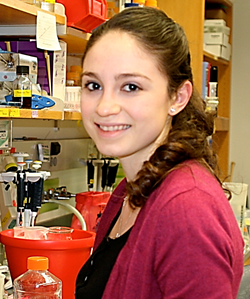
Diana Chavez, Ph.D.
Department: Biological Sciences, 2018
Faculty Mentor: Brandt Eichman, Ph.D.
Dissertation Title: Replication Fork Remodeling by Helicase-Like Transcription Factor
Dissertation Abstract: During DNA replication, a moving replication fork can encounter various sources of replication stress that can lead the moving fork to stall. Organisms have developed various DNA damage response pathways that recruit and utilize multiple fork-remodeling enzymes to stabilize and repair stalled forks. These fork-remodeling enzymes are SNF2 DNA dependent ATPases that catalyze very similar fork-remodeling reactions in vitro. Even though they are essential in promoting fork restart, there is still much unknown about their mechanism of action and specificity. One of these enzymes is the Helicase-Like Transcription Factor (HLTF). HLTF is a DNA translocase that is a key mediator in DNA damage tolerance pathways, is involved in tumor suppression, and catalyzes fork regression in vitro. In addition to a RING finger motif located within a SNF2 ATPase motor domain, HLTF contains a HIP116, Rad5p N-terminal (HIRAN) domain, which has been predicted to function as a DNA substrate recognition domain that is essential to HLTF function. This dissertation utilizes biochemical and structural techniques to characterize the HIRAN domain of HLTF and determine how HIRAN impacts HLTF fork remodeling functions. This work provides a better understanding of HLTF’s mechanism of action and specificity, and provides insight into the differences in mechanism and specificity of these fork-remodeling enzymes in promoting genomic stability
